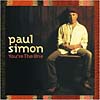
Comment
on this story
Sound Bites
Black Eyed Peas
Bridging the Gap (Interscope)
Spiritual descendants of the Native Tongues school of hip-hop, the California trio keeps the old school faith on their thoroughly likable second release. Guests range from forefathers (De La Soul) to fellow travelers (Mos Def, Macy Gray), but this is solidly the Peas' show, largely self-produced and infused with a loose West Coast dance floor vibe. "Weekends" is an old-time party jam of the first order, "Cali to New York" revisits De La's Daisy-era sound with a dose of G-funk, and the title track is an everybody-get-together quiet storm (complete with classical guitar). Warm and fuzzy as often as it is lean and funky, and clever to boot (see "Rap Song").
Kelly Willis
One More Time/The MCA Recordings (MCA)
OK, so it's an attempt by Willis' old label to cash in on her 1999 semi-breakthrough What I Deserve. It's also a chance to hear choice cuts from her three Nashville releases without trudging through their studio-slick low points. What you get is a nice crop of songs by a great selection of songwriters (Kostas, Jim Lauderdale, Paul Kelly, Marshall Crenshaw), all of them wrapped in Willis' honey-soaked twang. As a whole, it's less confident or personal than What I Deserve, but disarming nonetheless. The sound of a woman looking for her voice.
Indigo Girls
Retrospective (Epic)
The liner notes are by Susan Faludi and include lines like, "[T]he Indigo Girls are releasing this retrospective into an uneasy future for women's and gay-and-lesbian rights." Yes, well. As standard bearers for assorted causes, the Girls make pretty fair music. But as musicians, they sound like standard bearers. The favorites are all here—"Closer to Fine," "Galileo," "Shame on You"—complete with their sometimes hummable hooks and always insufferable lyrics. The harmonies are what they've always been, earnest and overbearing. I don't doubt their good intentions, but in the post-riot-grrl era, this sounds about as confrontational as Al Gore clearing his throat.
Enon
Believo! (See Thru Broadcasting)
Their very rock 'n' roll opening set for Flaming Lips the other week sent me back to this year-old release with a new appreciation. (This may be heresy of some sort, but for my $17 that evening, they blew away the headliners—I could only take so much of the Lips' faux-ironic grandeur.) Enon is equal parts would-be R&B sex machine, dreamy post-rock, and knob-twiddly navel-gazing. Their real trick is harnessing all of that to good old-fashioned songs, with verses and choruses and everything. You get the feeling they actually want you to sing along. And dance, too.
—Jesse Fox Mayshark
|
 |

This week: Maturity tempers an old master and some young punks
by Jesse Fox Mayshark
Paul Simon

You're the One (Warner Bros.)
Paul Simon takes so long between albums that each release raises expectations of a Big Event. It's not an unfair burden, exactly; Simon is one of the greatest living American songwriters, and he's also one of the rare pop musicians whose work has consistently matured and deepend. He's the only significant artist of the 1960s who you can argue reached his peak (with Graceland) in the 1980s.
But sometimes an album's just an album, and if you're looking for a masterpiece from the 2000-model Simon, you're going to be disappointed by You're the One. Coming off his failed Broadway musical The Capeman (which sported some fine music, no matter how muddled the staging), he's recorded a laid-back set of songs about aging, loving, and the quest for tranquillity. It's a pleasant effort, but compared to Graceland or even 1990's The Rhythm of the Saints, it's a modest achievement—a minor work by a major artist.
It opens with one of its high points, the gorgeous "That's Where I Belong," which sounds like a reaffirmation of purpose: "Somewhere in a burst of glory, sound becomes a song/ I'm bound to tell a story/ That's where I belong." He can still hit those sweet soulful notes, and he's clearly learned to enjoy the pleasures of his own voice. Musically, the track sets the tone for the rest of the album. Simon has returned to legendary session drummer Steve Gadd, who provided the rhythmic underpinning for most of his 1970s work, but he's teamed with African guitarist Vincent Nguini and bass player Bakithi Kumalo. The result is a gentle mingling of Simon's early melancholy sound and his later Afropop explorations.
The songs don't differentiate themselves that much; the melodies are subdued, sometimes more implied than expressed. There are beautiful bits of writing here, both tender and funny—"All my life I've been a wanderer/ Not really, I mostly lived near my parents' home"—but there are some uncharacteristic misfires too. "Old" reaches for wisdom but feels a little glib, and "Pigs, Sheep and Wolves" is an Orwell-style political allegory that wanders around a couple of points without actually making any of them. But when Simon closes the album with "Quiet," a lovely meditation on mortality and enlightenment, you can't help but appreciate his continued presence. Still with us after all these years.
Green Day

Warning: (Reprise)
I can't make a case for Green Day as great artists of our time, but they sure can write and play the hell out of a pop song. Warning:, being their fifth album and therefore the mandatory "maturity" opus, clarifies and magnifies that gift. You can't really call them punk rockers anymore, and they sound like they couldn't care less. There are more acoustic guitars than before, and not just on the now-requisite slow song. The liner notes credit lead sneerer Billie Joe Armstrong with "vocals, guitar, mandolin, harmonica," drummer Tré Cool with "drums, percussion, accordion," and even list one of Tom Petty's Heartbreakers among the guest artists.
But growed up doesn't equal give out, and Warning: is every bit the infectious rock'n'roll equal of any of their previous outings. The title track kicks things off with the kind of hear-it-once, hum-it-forever hook that Green Day seems capable of writing in their sleep, and most of the rest follow suit. Sometimes I think their effortless melodicism works against them, precisely because of its transparency. If catchy tunes are really as easy to come by as this band makes it seem, why don't more people write them? There are couple trademark loping shuffles here, including the almost maddeningly perfect leadoff single, "Minority." Elsewhere, "Church on Sunday" is Buddy Holly for reformed delinquents (which isn't a bad description of the band as a whole), and "Hold On" smartly recasts John Lennon's harmonica riff from "I Should Have Known Better."
Lyric-wise, Armstrong is more earnest than he is deft, but that's OK. His songs, mostly about trying to live honestly with himself and others, have an air of well-earned humility. And he's still not too grown up to sometimes just say, "F—- 'em all." We love you too, Billie Joe.

October 26, 2000 * Vol. 10, No. 43
© 2000 Metro Pulse
|